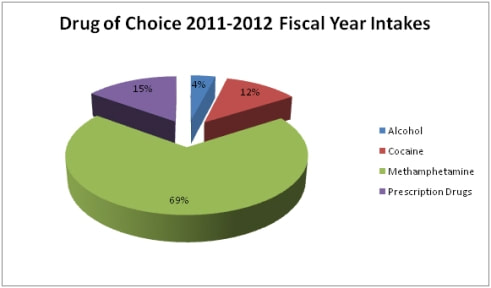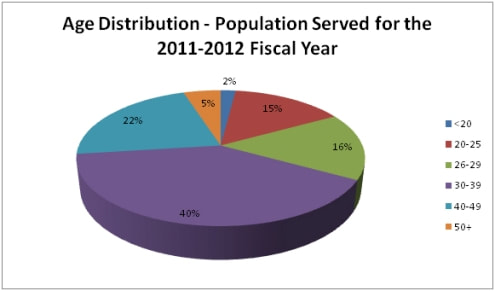Weakley County Drug Court
Purpose And Nature
The Twenty-Seventh Judicial District Drug Court Program serving Weakley and Obion counties of West Tennessee began operation in November of 2002. This post plea treatment program targets non-violent offenders suffering from severe substance abuse issues. Clients accepted into the program receive intensive treatment, intensive supervision, frequent drug screens, and continued judicial intervention.
Twenty-Seventh Judicial District Drug Court Program Mission
The mission of the Twenty-Seventh Judicial District is to reduce the crime rate by targeting and treating severe substance abusers within the 27th Judicial District.
Twenty-Seventh Judicial District Drug Court Program Goals
Goal 1: Reduce drug related crime in Weakley and Obion counties of rural West Tennessee.
Goal 2: Reduce drug dependency among drug court clients.
Goal 3: Increase financial responsibilities among drug court clients.
Goal 4: Enhance educational and employment attainment among drug court clients.
Goal 5: Provide a team approach to serving offenders with substance abuse issues.
Goal 2: Reduce drug dependency among drug court clients.
Goal 3: Increase financial responsibilities among drug court clients.
Goal 4: Enhance educational and employment attainment among drug court clients.
Goal 5: Provide a team approach to serving offenders with substance abuse issues.
Drug Court Works: 2011-2012 Fiscal Year Program Data
2011-2012 Since Program Inception
Admitted 26 271
Successfully completed 10 111
Terminated 8 120
Admitted 26 271
Successfully completed 10 111
Terminated 8 120
The average time between date of admission/enrollment and date of successful completion for 2011/2012 fiscal year is 22 months. The overall average time in the program is 15 months.
Overall Recidivism
Successful completions who have at least one conviction within one year of program completion is 14%.
Successful completions who have at least one conviction within two years of program completion is 28%.
In-Program Recidivism
Participants convicted of at least one new charge while in the program is 15%.
Graduation Rate 2011-2012 FY = 48%
Retention Rate 2011-2012 FY = 52%
Overall Recidivism
Successful completions who have at least one conviction within one year of program completion is 14%.
Successful completions who have at least one conviction within two years of program completion is 28%.
In-Program Recidivism
Participants convicted of at least one new charge while in the program is 15%.
Graduation Rate 2011-2012 FY = 48%
Retention Rate 2011-2012 FY = 52%
Eligibility Criteria And Application Process
To be eligible for Drug Court a defendant must:
* Be charged with or convicted of a non-violent criminal offense in the 27th Judicial District
* Have had no past conviction involving violence
* Have a substance abuse problem
* Be willing to accept the terms and conditions of the program
* Have transportation available
* Reside in the 27th Judicial District
* Not be acutely mentally ill or suicidal
* Be charged with or convicted of a non-violent criminal offense in the 27th Judicial District
* Have had no past conviction involving violence
* Have a substance abuse problem
* Be willing to accept the terms and conditions of the program
* Have transportation available
* Reside in the 27th Judicial District
* Not be acutely mentally ill or suicidal
Applications should be submitted immediately after arrest or indictment. If a defendant is accepted for the Drug Court Program and has not been indicted, he or she will proceed to the Circuit Court through criminal information. Persons who have already been convicted and sentenced are also eligible for the Drug Court Program.
The Application Procedure is as follows:
* Submission of written application to the District Attorney General
* Defendant's attorney must assist in the preparation of the application.
* Interview by probation officer
* Approval or rejection by the Drug Court Program Team
* If approved, appearance in Circuit Court for guilty plea (if not previously convicted and sentenced).
* A written contract will be signed by the defendant, the attorney and the Court.
* Defendant's attorney must assist in the preparation of the application.
* Interview by probation officer
* Approval or rejection by the Drug Court Program Team
* If approved, appearance in Circuit Court for guilty plea (if not previously convicted and sentenced).
* A written contract will be signed by the defendant, the attorney and the Court.
Treatment And Supervision
Treatment
Treatment begins with a comprehensive assessment designed to identify the presence and extent of a substance abuse disorder, mental status, motivation, strengths and weaknesses, and general appropriateness for treatment of an application.
If accepted by the Drug Court Program Team, the defendant will begin the program and will attend counseling four days per week. Defendants complete each phase of program by achieving certain treatment goals including abstinence, employment, attendance and compliance with group and supervision goals. Defendants spend less time in counseling with each successive phase. All treatment is individually tailored to address the person's addictive and criminal behavior.
Treatment begins with a comprehensive assessment designed to identify the presence and extent of a substance abuse disorder, mental status, motivation, strengths and weaknesses, and general appropriateness for treatment of an application.
If accepted by the Drug Court Program Team, the defendant will begin the program and will attend counseling four days per week. Defendants complete each phase of program by achieving certain treatment goals including abstinence, employment, attendance and compliance with group and supervision goals. Defendants spend less time in counseling with each successive phase. All treatment is individually tailored to address the person's addictive and criminal behavior.
Supervision
Defendants in the Drug Court Program will:
* Be subject to curfew restriction and/or electronic monitoring and will be seen at home by a case officer and/or law enforcement officers at least once per week. (Less frequent for Phase II and Phase III)
* Report to case officer twice per week (Less often for Phase II and Phase III)
* Complete a minimum of 100 hours of community service work
* Obtain and maintain employment
* Make regular payments toward fines, court costs, restitution and supervision fees
* Be subject to random drug screening in addition to being screened by the treatment provider
Defendants in the Drug Court Program will:
* Be subject to curfew restriction and/or electronic monitoring and will be seen at home by a case officer and/or law enforcement officers at least once per week. (Less frequent for Phase II and Phase III)
* Report to case officer twice per week (Less often for Phase II and Phase III)
* Complete a minimum of 100 hours of community service work
* Obtain and maintain employment
* Make regular payments toward fines, court costs, restitution and supervision fees
* Be subject to random drug screening in addition to being screened by the treatment provider
Court Sessions
The Drug Court will meet on Thursday at the Weakley County Detention Center and on Fridays at the Obion County Detention Center. Defendants in the program appear in Court as directed by the Court.
The Drug Court will meet on Thursday at the Weakley County Detention Center and on Fridays at the Obion County Detention Center. Defendants in the program appear in Court as directed by the Court.
Incentives and Sanctions
Incentives will be given to those who successfully complete various steps in the program. Sanctions will be imposed upon those who violate the terms of treatment and probation. The severity of the sanctions will depend upon the type of violation and the number of prior violations. The most severe sanction will be expulsion from the Drug Court Program, which will require a sentence to the Tennessee Department of Corrections.
Incentives will be given to those who successfully complete various steps in the program. Sanctions will be imposed upon those who violate the terms of treatment and probation. The severity of the sanctions will depend upon the type of violation and the number of prior violations. The most severe sanction will be expulsion from the Drug Court Program, which will require a sentence to the Tennessee Department of Corrections.
Completion of Program
Those persons who successfully complete the program will be placed on probation which shall be supervised or unsupervised which is in the discretion of the Court.
Those persons who successfully complete the program will be placed on probation which shall be supervised or unsupervised which is in the discretion of the Court.
Program Funding
Obion and Weakley County Government
Office of Criminal Justice Programs Grant
Drug Court Treatment Reserve
DUI Treatment Fees
Participant Fees
Charitable Contributions
Office of Criminal Justice Programs Grant
Drug Court Treatment Reserve
DUI Treatment Fees
Participant Fees
Charitable Contributions
CONTACT US
Weakley County Drug Court
Westate Corrections
128 E. Main Street, Suite C, Union City, 38261
Mailing: P.O. Box 1232, Union City, TN 38281
731-885-3411 (p)
[email protected]
Hours: 8:00 AM - 4:30 PM, M - F
Westate Corrections
128 E. Main Street, Suite C, Union City, 38261
Mailing: P.O. Box 1232, Union City, TN 38281
731-885-3411 (p)
[email protected]
Hours: 8:00 AM - 4:30 PM, M - F









